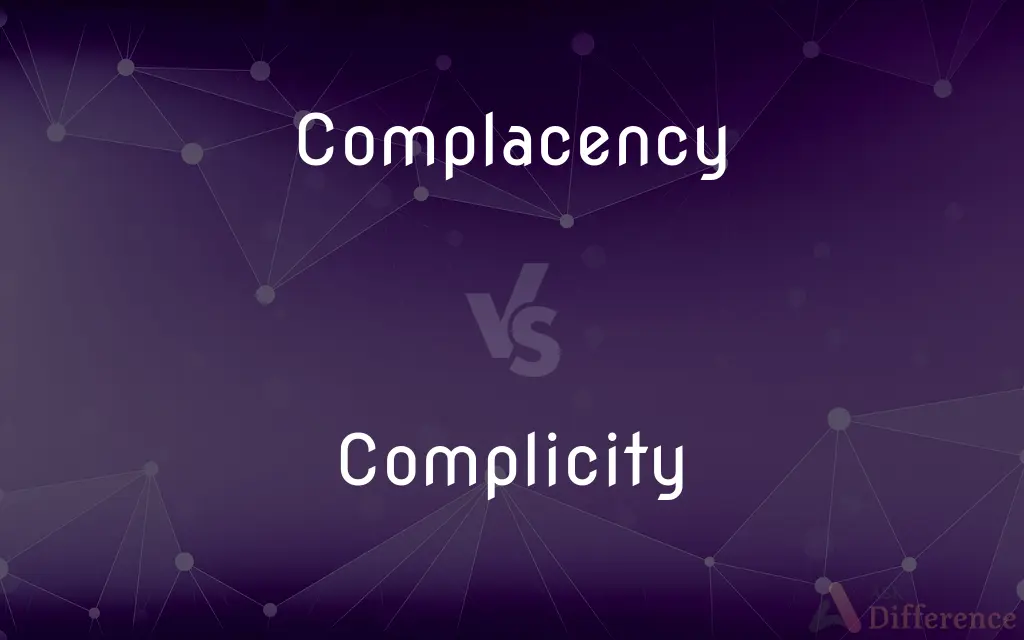Complacency vs. Complicity — What's the Difference?
Edited by Tayyaba Rehman — By Fiza Rafique — Updated on April 23, 2024
Complacency refers to self-satisfaction accompanied by unawareness of actual dangers or deficiencies, while complicity involves participation or involvement in wrongdoing or unethical activity.

Difference Between Complacency and Complicity
Table of Contents
ADVERTISEMENT
Key Differences
Complacency occurs when an individual or group feels overly content with their achievements or situation, often ignoring potential risks or failing to seek improvement. Whereas complicity involves active or passive assistance in wrongful acts, highlighting a moral failing or ethical lapse.
Complacency can lead to a lack of progress or decline in performance as individuals or organizations fail to respond to new challenges or changes. On the other hand, complicity directly impacts others negatively, as it includes cooperation in harmful or illegal acts.
While complacency is generally seen as a personal or internal state affecting motivation and vigilance, complicity requires interaction or collaboration with others to commit or conceal unethical actions. Complicity, therefore, has a relational aspect, depending on cooperation or collusion.
The dangers of complacency are often subtle and long-term, such as missed opportunities or gradual deterioration. Conversely, the consequences of complicity can be immediate and severe, often involving legal penalties or significant damage to one's reputation.
Comparison Chart
Definition
Self-satisfaction without awareness of risk
Involvement in wrongdoing
ADVERTISEMENT
Primary Effect
Lack of progress, missed opportunities
Ethical breaches, legal consequences
Key Characteristic
Internal state, passivity
Active or passive cooperation
Consequences
Gradual decline, inefficiency
Immediate ethical and often legal repercussions
Contextual Usage
Personal development, organizational growth
Legal, ethical discussions
Compare with Definitions
Complacency
The danger of becoming too comfortable and ignoring potential threats.
The team's complacency after several wins cost them the championship.
Complicity
Often related to ethical breaches and legal implications.
The corporation’s complicity in environmental violations led to heavy fines.
Complacency
Often associated with a lack of motivation to change or improve.
His complacency about his job performance led to missed promotions.
Complicity
Requires interaction or agreement with others.
Their complicity in the conspiracy was proven with intercepted communications.
Complacency
Seen as an internal attitude or state.
The company culture fostered complacency, avoiding innovation.
Complicity
Participation in or the act of being complicit in wrongdoing.
He was charged with complicity in the fraud scheme.
Complacency
Can result in a status quo or regression.
Complacency in the market has seen the company lose its competitive edge.
Complicity
Can include both direct participation and failure to act.
By not reporting the illegal activities, he was complicit.
Complacency
A feeling of uncritical satisfaction with oneself or one's achievements.
Complacency in safety procedures can lead to accidents.
Complicity
Involves knowledge of the wrongful act and a decision to aid or ignore.
Her silence amounted to complicity in the cover-up.
Complacency
A feeling of contentment or self-satisfaction, especially when coupled with an unawareness of danger, trouble, or controversy.
Complicity
Complicity is the participation in a completed criminal act of an accomplice, a partner in the crime who aids or encourages (abets) other perpetrators of that crime, and who shared with them an intent to act to complete the crime. A person is an accomplice of another person in the commission of a crime if they purpose the completion of a crime, and toward that end, if that person solicits or encourages the other person, or aids or attempts to aid in planning or committing the crime, or has legal duty to prevent that crime but fails to make an effort to prevent it properly.Unlike attempt, solicitation, and conspiracy, which are crimes in and of themselves, complicity is not itself a crime but is a way of committing a crime.
Complacency
An instance of contented self-satisfaction.
Complicity
Involvement as an accomplice in a questionable act or a crime.
Complacency
A feeling of contented self-satisfaction, especially when unaware of upcoming trouble.
Complicity
The state of being complicit; involvement as a partner or accomplice, especially in a crime or other wrongdoing.
Complacency
An instance of self-satisfaction.
Complicity
(archaic) Complexity.
Complacency
Passivity as a result of contentment with the current situation.
Complicity
The state of being an accomplice; participation in guilt.
Complacency
The feeling you have when you are satisfied with yourself;
His complacency was absolutely disgusting
Complicity
Guilt as an accomplice in a crime or offense
Common Curiosities
Can complacency lead to complicity?
Yes, complacency can lead to complicity if it causes individuals to ignore unethical practices and thus become part of the problem.
How do complacency and complicity differ in impact?
Complacency affects personal and organizational growth by fostering inaction, while complicity has ethical and legal consequences due to involvement in wrongdoing.
Why is it important to overcome complacency?
Overcoming complacency is crucial for continuous improvement, innovation, and avoiding potential risks or declines in performance.
What does complicity mean?
Complicity involves participation in wrongdoing or unethical behavior, either actively or by failing to prevent it.
What are the signs of complicity in a workplace?
Signs include ignoring unethical behavior, rationalizing misconduct, or helping to conceal improper actions.
What measures can be taken against complicity?
Measures include enforcing strict ethical guidelines, providing training on legal responsibilities, and encouraging whistleblowing.
What is complacency?
Complacency refers to self-satisfaction with one's achievements without awareness of potential dangers or deficiencies.
What are the consequences of being complicit?
Being complicit can result in legal action, loss of reputation, and serious ethical breaches.
Can complacency affect safety?
Yes, complacency in safety practices can lead to underestimating risks and failing to enforce necessary precautions, resulting in accidents.
What legal risks are associated with complicity?
Legal risks can include criminal charges, civil liabilities, and penalties, depending on the nature of the wrongdoing involved.
How can organizations prevent complacency?
Organizations can prevent complacency by promoting continuous learning, encouraging feedback, and maintaining high standards.
How does society view complacency versus complicity?
Society generally views complacency negatively as it denotes laziness or lack of ambition, while complicity is seen as morally and often legally reprehensible.
What can be done to cultivate an organizational culture free of complacency and complicity?
Cultivating such a culture involves setting clear expectations, fostering open communication, rewarding integrity, and consistently enforcing rules.
How do personal values relate to complacency and complicity?
Personal values play a crucial role; strong ethical values can help individuals resist complacency and avoid complicity.
Is complicity always intentional?
Complicity can be both intentional and unintentional; unawareness does not necessarily absolve one from being complicit if they had a duty to know and act.
Share Your Discovery

Previous Comparison
Indisposable vs. Indispensable
Next Comparison
Luncheon vs. LunchAuthor Spotlight
Written by
Fiza RafiqueFiza Rafique is a skilled content writer at AskDifference.com, where she meticulously refines and enhances written pieces. Drawing from her vast editorial expertise, Fiza ensures clarity, accuracy, and precision in every article. Passionate about language, she continually seeks to elevate the quality of content for readers worldwide.
Edited by
Tayyaba RehmanTayyaba Rehman is a distinguished writer, currently serving as a primary contributor to askdifference.com. As a researcher in semantics and etymology, Tayyaba's passion for the complexity of languages and their distinctions has found a perfect home on the platform. Tayyaba delves into the intricacies of language, distinguishing between commonly confused words and phrases, thereby providing clarity for readers worldwide.














































